Athena is one of the most revered and powerful deities in ancient Greek mythology. Known for her wisdom, courage, and strategic warfare, she stands as a symbol of intellect, justice, and the protector of Athens. In this article, we will explore the origins, attributes, and cultural significance of Goddess Athena, who continues to inspire awe to this day. Follow archeology.dulichvn.net to learn more about mysterious artifacts.
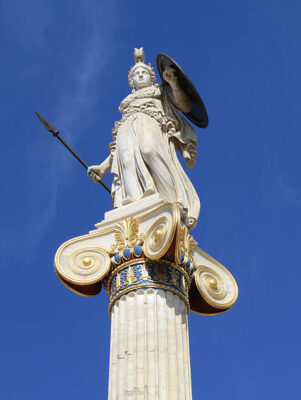
The Origins of Athena
Birth from the Head of Zeus: A Mythological Marvel
Athena’s birth is one of the most fascinating tales in Greek mythology, highlighting her extraordinary nature and divine authority. According to legend, Athena was born fully grown, clad in gleaming armor, from the forehead of Zeus, the king of the gods. This miraculous event was not without cause or drama. Zeus had swallowed her mother, Metis, the goddess of wisdom, after receiving a prophecy that their child would surpass him in power and intellect.
As Zeus began to suffer from an unbearable headache, he called upon Hephaestus, the god of blacksmithing, to relieve him. With a mighty strike of his hammer, Hephaestus split Zeus’s skull open, and from it sprang Athena, fully formed and armed for battle. Her emergence symbolized the perfect fusion of wisdom, inherited from her mother Metis, and divine strength, gifted by Zeus. This unique origin story set Athena apart as a deity of unparalleled intellect and prowess, embodying both feminine wisdom and masculine strength.
Athena’s Central Role in Greek Mythology
Athena’s influence extends across a myriad of Greek myths, where she is celebrated as the goddess of wisdom, strategic warfare, and craftsmanship. Unlike her counterpart Ares, who represented the chaotic and destructive side of war, Athena embodied strategy, justice, and discipline in conflict.
One of her most celebrated roles was as the protector and guide of Odysseus during his arduous journey home in The Odyssey. Athena provided wisdom, guidance, and divine intervention to help him navigate countless challenges, from outsmarting the Cyclops Polyphemus to reclaiming his kingdom in Ithaca. Her unwavering support highlights her role as a mentor and protector of mortals, especially those who exhibited cunning and intellect.
Athena was also integral to the myth of Perseus, whom she aided in defeating the Gorgon Medusa. She provided him with a polished shield to use as a mirror, allowing him to slay the monster without meeting her deadly gaze. These stories, among others, reinforce Athena’s reputation as a goddess who values courage, resourcefulness, and justice.
Athena and the Parthenon: A Monument to Her Glory
The Parthenon, perched on the Acropolis of Athens, stands as a timeless tribute to Athena’s prominence in Greek culture. This magnificent temple, constructed in the 5th century BCE, was designed to honor Athena as the city’s patron deity. Its name derives from Athena Parthenos, meaning “Athena the Virgin,” a reference to her purity and strength.
Inside the Parthenon once stood a colossal statue of Athena crafted by the renowned sculptor Phidias. Made of gold and ivory, the statue depicted the goddess in full armor, holding Nike, the winged figure of victory, in her hand. The Parthenon’s intricate sculptures and friezes also celebrated her achievements, depicting scenes such as her contest with Poseidon for the patronage of Athens.
The city itself, named after Athena, honored her with grand festivals, including the Panathenaic Games, which featured athletic, musical, and artistic competitions. The olive tree, her sacred gift to the Athenians, became a symbol of peace, prosperity, and the enduring connection between the goddess and her people.
Athena’s association with the Parthenon underscores her embodiment of wisdom, justice, and the ideals of civilization. The temple remains a testament to her significance, reflecting the values and aspirations of ancient Athens. Today, it stands as a symbol of classical beauty and cultural heritage, drawing millions of visitors who marvel at the legacy of this extraordinary goddess.
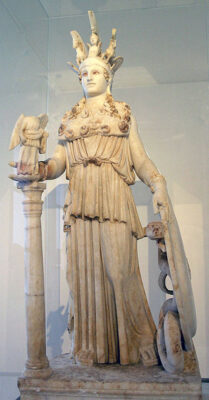
Athena’s Key Attributes
Athena: Goddess of Wisdom and Knowledge
Athena is revered as the embodiment of wisdom, intellect, and strategic thought in Greek mythology. Unlike her counterpart Ares, who symbolizes the chaos and bloodshed of war, Athena approaches conflict with calculated precision and rationality. Her brilliance lies in her ability to combine intellect with action, devising strategies that ensure victory without unnecessary destruction.
Depicted in countless works of art and literature, Athena often holds a scroll or book, underscoring her role as the patroness of learning, philosophy, and innovation. Her wisdom is not limited to warfare; it extends to guiding leaders, inspiring poets, and mentoring heroes, making her an indispensable figure in the realm of ancient knowledge and culture.
A Symbol of Courage and Justice
Athena is more than a goddess of intellect; she is also a paragon of courage and justice. In myths and art, she is frequently portrayed wielding a shield and spear, signifying her readiness to defend the vulnerable and uphold moral order. Unlike the reckless aggression associated with Ares, Athena’s bravery is measured, purposeful, and rooted in the pursuit of justice.
One of her most iconic symbols is the Aegis, a protective cloak or shield often adorned with the head of Medusa. This powerful artifact symbolizes her role as a guardian deity, capable of warding off evil and protecting the righteous. Through her actions, Athena demonstrates that true courage is found in defending principles and safeguarding harmony.
The Olive Tree: A Gift of Peace and Prosperity
Athena’s connection to peace is beautifully illustrated in her gift to the city of Athens—the olive tree. In the myth of her contest with Poseidon for the patronage of the city, Athena’s offering of the olive tree was deemed more valuable than Poseidon’s saltwater spring. The olive tree provided nourishment, oil, and wood, symbolizing sustenance, economic prosperity, and the enduring importance of agriculture.
This sacred tree became a cornerstone of Athenian culture, representing peace and the fruitful coexistence of nature and civilization. Athena’s dual association with both war and peace highlights her multifaceted character: a goddess who understands that wisdom and strategy are as crucial in fostering harmony as they are in achieving victory.
In modern times, the olive tree continues to symbolize peace and unity, a legacy rooted in Athena’s timeless influence. Through this sacred gift, she reminds us of the importance of balancing strength with compassion and power with wisdom.
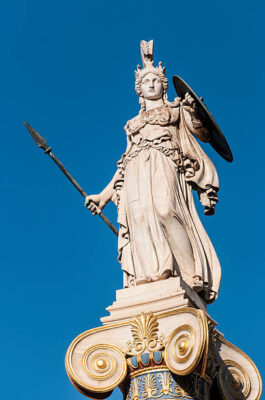
See more: Explore The World’s Largest Mosaic Unearthed In Turkey
Athena’s Influence in Ancient Greece
Athena’s Role as a Protector of Cities
Athena was venerated as the protector and guardian of numerous Greek cities, most notably Athens, which bears her name. According to myth, Athena won the patronage of the city through her gift of the olive tree, symbolizing prosperity and peace. To the Athenians, she was more than a deity; she was the embodiment of their civic identity and aspirations. They believed their achievements in art, philosophy, and governance reflected her divine favor and guidance.
In times of war, Athena was invoked to shield the city from harm. Unlike other deities of war, her protection was rooted in strategic defense rather than offensive aggression. Her wisdom and foresight ensured the safety and flourishing of Athens, and her presence was a constant reminder of the city’s resilience and ingenuity.
Athena’s Presence in Greek Art
The image of Athena is one of the most enduring in ancient Greek art, capturing her dual nature as both a warrior and a wise protector. She is often depicted wearing a crested helmet, carrying a spear, and bearing a shield emblazoned with the terrifying head of the Gorgon Medusa—a symbol of her ability to ward off evil.
One of the most iconic representations of Athena is the Athena Parthenos, a colossal statue created by the renowned sculptor Phidias. This masterpiece once stood in the Parthenon, symbolizing the glory and power of Athens. Made of gold and ivory, the statue depicted Athena in full armor, holding a smaller statue of Nike, the goddess of victory, in her hand. Pottery, mosaics, and frescoes from the ancient world also frequently featured her, emphasizing her importance across various aspects of Greek life and culture.
Athena’s Legacy in Modern Culture
Athena’s influence transcends ancient mythology, continuing to inspire modern culture in profound ways. She serves as a symbol of wisdom, justice, and empowerment, representing ideals that resonate across generations. Her role as a female leader has made her a figure of inspiration in movements advocating for equality and intellectual achievement.
The Parthenon itself, and by extension Athena Parthenos, remains a powerful cultural icon. Modern recreations of the statue and references to Athena in literature, art, and media highlight her enduring relevance. In civic symbolism, Athena often appears in emblems, logos, and statues worldwide, particularly in institutions dedicated to education, justice, and governance. Her legacy reminds us that wisdom, strategy, and courage are timeless virtues essential for personal and societal progress.
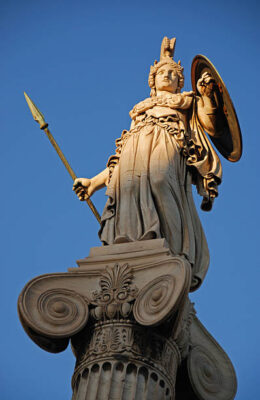
Conclusion
Goddess Athena is a figure whose influence has stretched far beyond ancient Greek mythology. With her wisdom, courage, and strategic prowess, she remains a powerful symbol of intellect and justice. As both a protector of cities and a goddess of peace and war, Athena’s legacy continues to inspire and shape our understanding of strength, wisdom, and the balance between war and peace. Through art, myth, and modern symbolism, Athena’s power endures as a testament to her eternal significance in human culture.

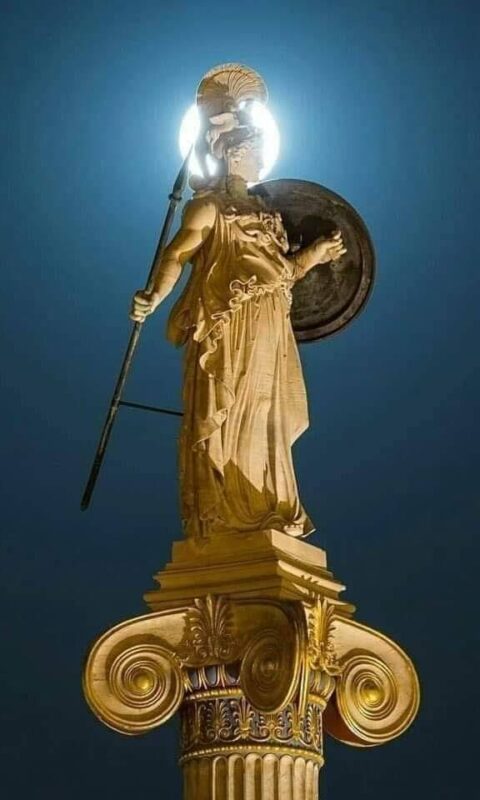
CÁC TIN KHÁC
Mary Walton: The Forgotten Inventor Who Helped Clean Up America’s Cities
Tomb of Queen Nefertari in the Valley of the Queens, Egypt
Discover the Hypostyle Hall of the Temple of Hathor at Dendera
Venus de Losange: Unveiling the Mystery of a 20,000-Year-Old Paleolithic Icon